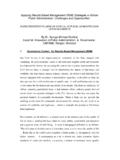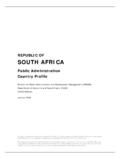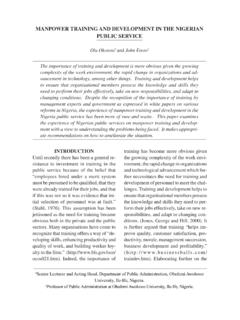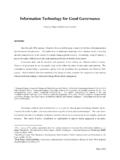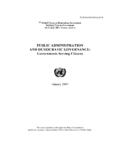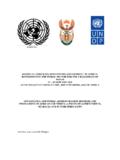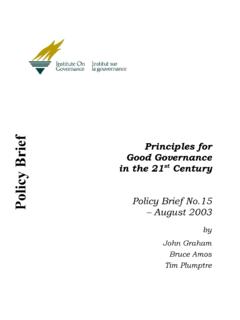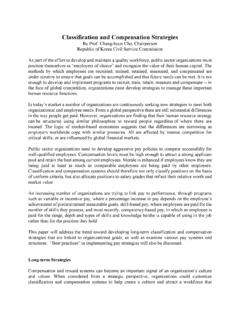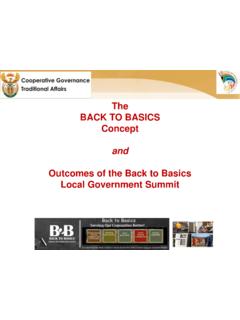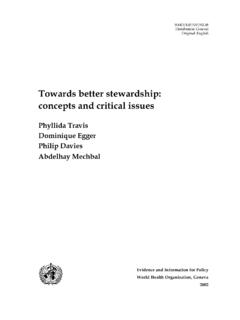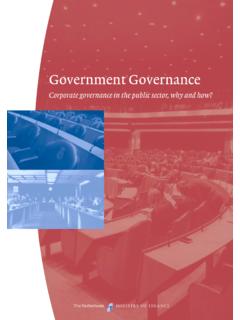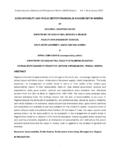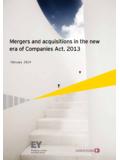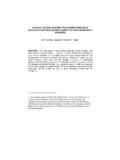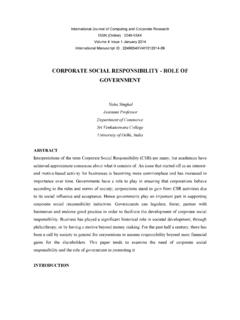Transcription of Concept Paper: Transparency and Accountability in Public ...
1 1 RAB/01/006: Transparency and Accountability in the Public Sector in the Arab Region Concept paper 2 Transparency and Accountability in Public Financial Administration March 2004 _____ * UN DESA DPADM would like to acknowledge the authors of this paper , Mr. Suresh Shende and Mr. Tony Bennett. The views expressed therein are entirely those of the authors and do not necessarily reflect the views of the United Nations. 2 Introduction The term democracy minimally presupposes three essential elements: Transparency , Accountability , and equality. Transparency denotes free access to governmental political and economic activities and decisions.
2 Accountability entails a state being held responsible, by both its people and its elected bodies, for its choices and actions. And the Concept of equality [includes] citizens being treated equally under the law, as well as some degree of equal political participation among them in their own governance. Calls for Transparency , Accountability , and equality have emerged in the Arab world, with citizens summoning their governments to reveal their incomes and expenditures, as well as strategies and ambitions .1 While the author writes of Transparency , Accountability and equality as separate attributes, it is evident that the first two are not independent.
3 Transparency enables all stakeholders in a country to see the structure and functions of the government, its policy intentions and fiscal projections, and accounts for past periods. The main purpose of opening these windows is to render those inside accountable and answerable for their decisions and actions. Accountability is the obligation to render an account for the responsibility conferred. When systems for Public Transparency and Accountability are being devised, four questions must be considered: (a) who is accountable? (b) for what is s/he accountable? (c) to whom is s/he accountable? and (d) how is that Accountability discharged? As the discharge of Accountability requires Transparency , in this paper we will henceforth use the term Accountability as a shorthand for Accountability including Transparency .
4 2 This paper examines financial aspects of Accountability for the use of Public funds, that is, fiscal Accountability . It explains the growing demand for fiscal Accountability , answers the who, for what, to whom and how questions, describes the move toward performance Accountability , details the benefits and costs, and concludes with general recommendations. The paper does not cover other elements of governance, in which Transparency and Accountability are perhaps equally important, such as Transparency of national statistics on the national income, balance of payments, banking and non-banking institutions, regulatory bodies, etc. nor the Accountability of the private sector and non-government organizations.
5 The demand for Accountability The genesis of the current emphasis on financial Accountability can be attributed to five factors, as follows: Two decades of fiscal turbulence have contributed to a substantial erosion of credibility of governmental fiscal machinery, and to a growing distrust of governments; 1 Shafeeq Ghabra, Professor of Political Science at the University of Kuwait. 2 While Accountability subsumes Transparency , the opposite is not true. A great deal of Transparency is Public relations spin . RAB/01/006- Transparency and Accountability in the Public Sector in the Arab Region- Transparency and Accountability in Public Financial Administration 3 The gradual spread of globalization has put economic policymakers in many developing countries and economies in transition in a reactive mood, rather than proactive; external developments that do not always lend themselves to precise identification would appear to have a greater role, or even a dominating role on fiscal policies.
6 Information asymmetries have made the already formidable tasks of policymakers even more complex and intractable. In the absence of crucial information, the risks faced by the policymakers have increased significantly; The change in the nature of government and its gradual withdrawal from production activities has made it take an active role in regulation, which adds to the complexity of financial Accountability ; There has been a major change in the composition of expenditures of central and federal governments. Apart from sizeable outlays on the servicing of Public debt and on entitlement payments, expenditures at the central government level are increasingly devoted to contract payments, transfers to the private sector, and transfers to regional and local governments.
7 This has contributed to a separation of funding from the actual provision of services and has affected the pattern of financial Accountability . Over the years, the scope of financial Accountability has expanded rapidly and significantly, reflecting changing tasks and expectations and an emphasis on prudent macroeconomic management. This enhanced financial Accountability requires governments to be accountable for ensuring that there are adequate systems to secure and improve results and to maintain the financial condition of the state (fiscal sustainability, flexibility in the use of resources, and reduced financial vulnerability). Furthermore, governments are expected to demonstrate that the selected programmes are part of the legitimate functions of a government and that the community can afford them.
8 The current reality in many countries is far from what is expected. While several newly formed republics (such as those that were formerly in the Soviet Union) have established laws regarding the budget, its contents, and the overall financial system, thus laying a base for fiscal Transparency , in several other countries access of the Public to the budget, and full accounts, continues to be scant. In some countries, the Public gets only bits of information and full documentation on budgets and annual performance continues to be absent from the Public domain. It is likely that approximately one third of the world s population is in this area of darkness.
9 3 The experience of both industrial and developing countries shows that governments are generally engaged in circumvention of their own laws. The practices include generous window dressing of budget estimates of revenues and expenditures, avoidance of credit 3 A. Premchand (2001) Fiscal Transparency and Accountability : Idea and Reality. paper prepared for the UN-DESA Workshop on Financial Management and Accountability , Rome, Nov. 28-30, 2001. This source is also drawn on elsewhere in this paper . RAB/01/006- Transparency and Accountability in the Public Sector in the Arab Region- Transparency and Accountability in Public Financial Administration 4limits through an accumulation of unpaid bills, transfer of amounts toward the end of the year to deposit accounts to avoid lapse of funds, manipulation of performance data and associated means.
10 Window dressing involves projection of rosy scenarios of economic growth and policy measures yet to be formulated. A gullible Public may not always know what the government is doing. While these practices are sought to be minimized in some countries through a review of the estimates by the audit agency, or through an assessment by credit rating agencies, it should be noted that these efforts are, by and large, very limited. Meanwhile, in several cases the budget reflects creative accounting approaches that effectively mask the reality. These practices, to say the least, work against financial Accountability . There are vital gaps in most Public budgets and accounts.
